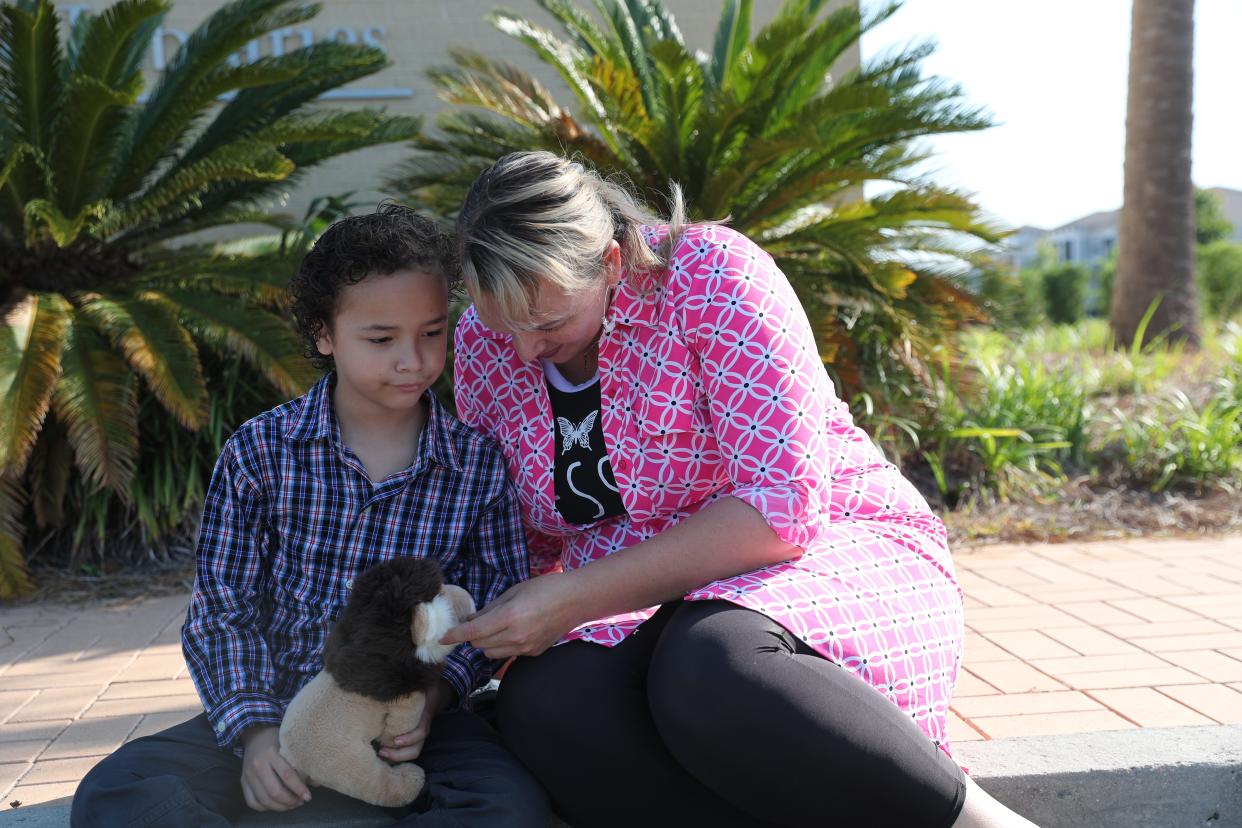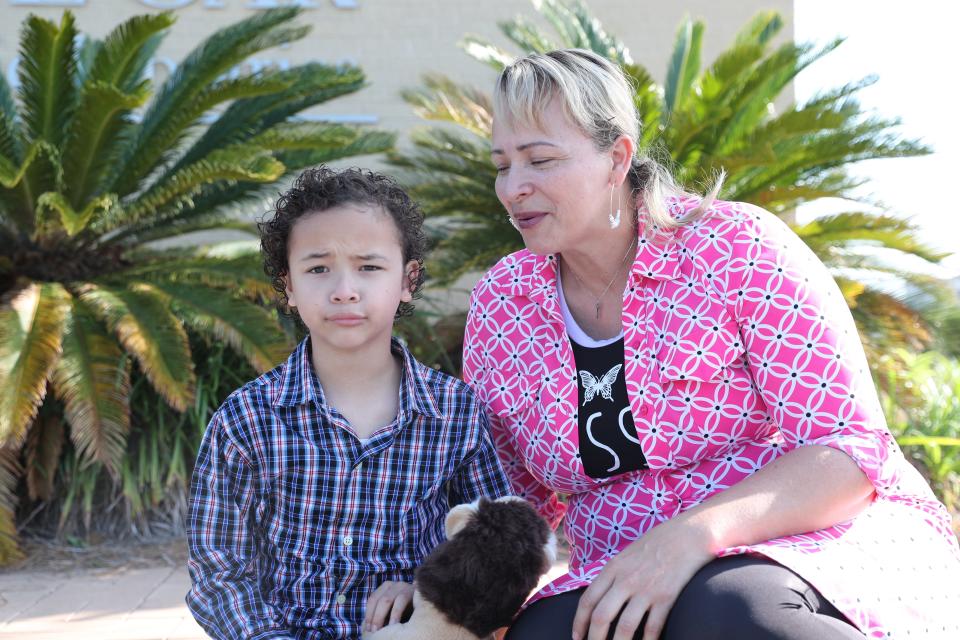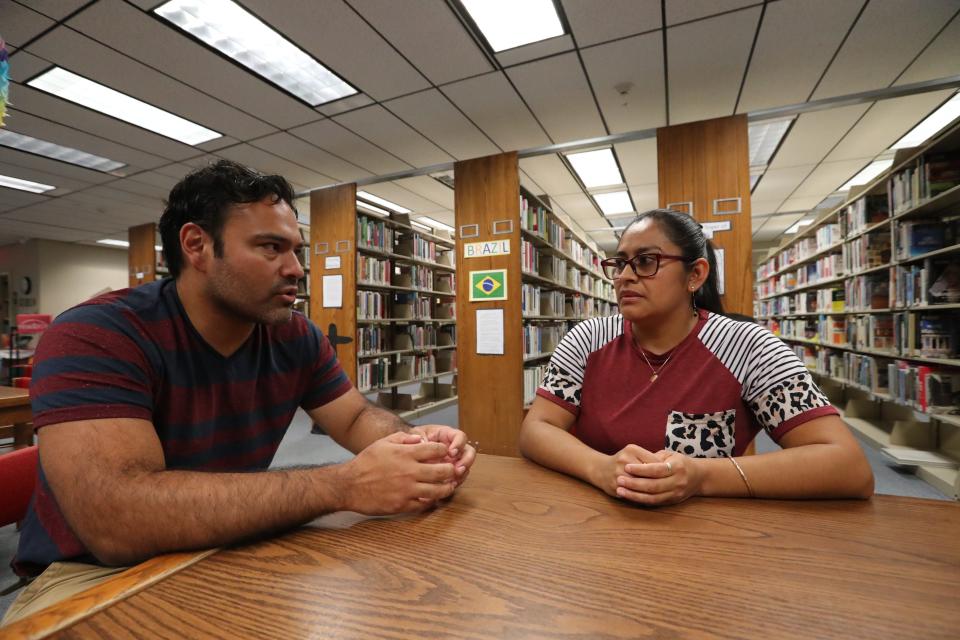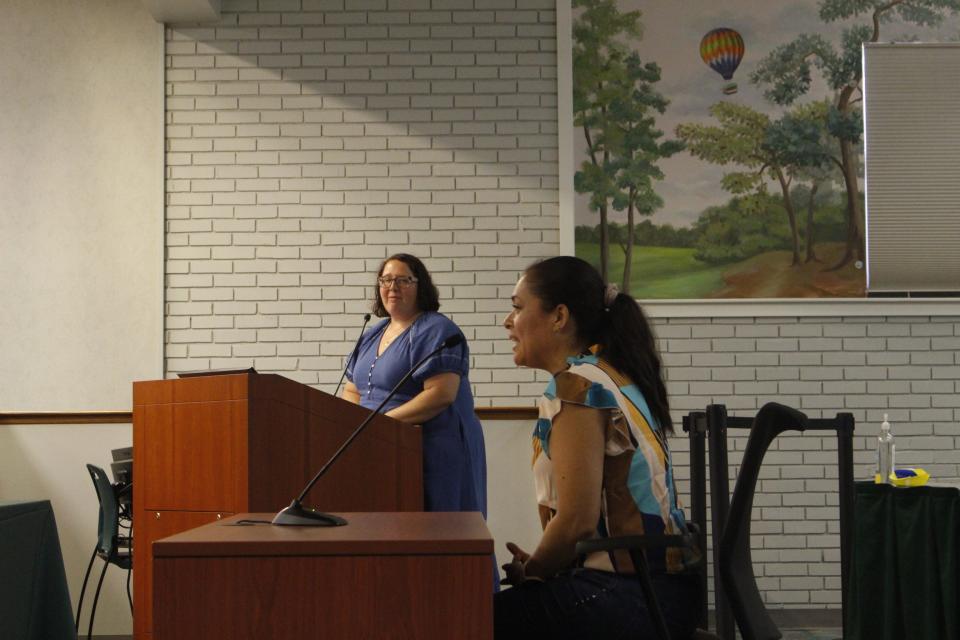Immigrant parents struggle to navigate the Savannah Chatham County school system

When Laura Alvarez’s seven-year-old son started refusing to go to school, she knew something was wrong. Ethan, who attends 2nd grade at Garden City Elementary, is autistic and was being bullied by classmates for his learning disability.
When Alvarez confronted the issue with Ethan’s homeroom teacher, she said she was met with a tepid response. “We don’t allow that type of behavior,” she recalled the teacher telling her. Alvarez, who immigrated from Costa Rica and primarily speaks Spanish, tried to explain that her son wouldn’t lie about being bullied, but her efforts to advocate for her child were hampered by the language barrier.
Alvarez said she understands English, but struggles to speak the language.
Soon, she realized that bullying wasn’t the only problem. Ethan was far behind in reading and writing than his peers. State and federal laws mandate that students with disabilities have a right to a “free, appropriate public education” facilitated by an Individualized Education Plan or IEP. That plan could include a paraprofessional to assist Ethan in the classroom, but Alvarez believes he wasn’t provided with one.
“They just pass him; they don’t pay any attention to him or care about his needs,” said Alvarez through a translator.
More on special education: Compliance, staffing issues plague special education in Savannah-Chatham Schools
More: Two-thirds of elementary students cannot read at grade level. The district plans to fix it
Halfway through the school year, Ethan accumulated about 46 absences ― a combination of doctor’s visits, school officials sending him home for behavioral issues and his own refusal to attend. On weekday nights, Ethan would cry out, “Oh, I have to go to school” as if it was “a punishment,” Alvarez described, and added that every morning during drop-off “it was like a battle.”
But school officials told her that if her son continued to miss class, they would have to call child protective services (CPS). Alvarez said she felt trapped between forcing her child to attend a school that wasn’t meeting his needs or risking punishment.
She said she was not provided any type of language assistance during these discussions despite Garden City Elementary being home to the largest group of Hispanic students in the school district (63%). And, about half of the student population are in the English to Speaker of Other Languages (ESOL) program, according to state data. Yet, the school does not have a designated interpreter for families who may need help communicating.

The issue is prevalent throughout the district whose student population is quickly diversifying. Alvarez is just one of many immigrant parents who feel they don’t have a voice in their child’s education because they don't speak proficient English.
Feeling distraught, Alvarez asked a bilingual friend, who was also a retired teacher, for help. Her friend was able to reason with the officials in a way that Alvarez couldn’t, she said.
“She basically told them (Garden City Elementary) to give us more options because forcing Ethan to come to school was not working,” recounted Alvarez, “and that it was my right to ask for these resources rather than be threatened with child protective services.”
After several meetings, Ethan was provided an alternative form of education ― a teacher who would visit their home twice a week. In this individualized environment, he’s doing much better and making more progress in learning than he was before. But Alvarez says it shouldn’t have taken so long to find a solution. Ethan regularly attends therapy sessions where he recounts the bullying and neglect he experienced in school. Alvarez said she worries this trauma will endure.
“Things would be different if I understood more about what to do, how to help my child, how to communicate,” she said. “Before that, he was just a normal kid. Now, he’s nervous about everything.”
When asked about Alvarez's experience, the Savannah Chatham County Public School System (SCCPSS) responded that the district will address specific concerns directly with the family and that they're "committed to treating all students fairly."
Next year, Alvarez hopes to place her son back into a classroom setting with other kids, but it won’t be in Garden City Elementary.
Holistic services needed beyond the classroom
As the school district population diversifies, the need for more holistic language resources is growing dire. In the same report that laid out the academic disparities between ELL students and their peers, findings also spotlighted the difficulties parents had in navigating the school system.
Based on a survey of 154 Spanish-speaking parents the main issues they faced were a lack of translation services and guidance on school procedures. Most school materials and websites are typically available only in English, so parents had to rely on their children to translate school materials and interactions more than half the time.
Read the report: Report highlights educational disparities for English learners in Savannah-Chatham Schools
Alejandro Del Razo, a parent to an SCCPSS student and a community organizer for MESE, has witnessed the issues play out first-hand. He’s helped struggling parents navigate the most basic aspects of their child’s education, such as enrolling in school, signing up for the bus system and opening accounts for the free lunch program.
“They don’t make it easy even for English-speakers, so for someone whose first language isn't’ English, it’s even harder,” said Del Razo.
The parents surveyed also noted that cultural insensitivity and discrimination sometimes marked their interactions with school staff. In some cases, the report states, parents were “accused of being at fault for students’ academic achievement without any outreach or feedback on academic progress or decline from their schools.”
Alvarez and other immigrant parents’ experiences point to needs that go beyond the classroom and the school yard. Their struggles have shown that if parents and guardians are shut out from their children’s education or discouraged from participating, the students suffer.
Parents struggle to get involved
Mayra Calderon is a mother of three students in the school district. Claudia, her youngest, goes to Rice Creek Elementary, a school outside of their designated zone. But because her daughter needs to attend the ESOL program there, Calderon drives from Garden City to Port Wentworth every morning, then to her GED class on the south side of the county. Every weekday, that’s a 60-mile round trip.
Due to her anxiety, Claudia was eligible for a special needs bus. But on the first day of school, that bus never came. Calderon said she was bounced from one department to another, while trying to figure out the problem.
“The school told me to call the transportation department and the transportation department told me to call the school again,” Calderon said.

Every time she visited the school front office, she said no one was able to translate or help. After months of back and forth, Calderon was able to schedule a meeting with school administrators and an ESOL teacher who knew some Spanish. Officials told her that the school had lost the psychologist’s note confirming her daughter’s anxiety, so that’s why the special bus was not provided.
“What’s going on?” she recounted of the meeting. “I’m waiting and waiting but nothing’s happening.”
MESE's Del Razo said he’s seen similar situations happen all too often. A parent struggles to get questions answered due to language difficulties, but also because of apathy from school administrators.
“The thing that I can see here is that nobody has the willingness to help, to say ‘let me step forward and have this done for this lady,’ The perception is, ‘If you don't’ speak English, I cannot help you,’” said Del Razo, who noted this mentality doesn’t bode well for the growing immigrant population in Georgia.
More: With at least 150 Afghan refugees moving to Savannah by February, one family tries to find a home
Between 2000 and 2019, Georgia’s immigrant population doubled, and as of 2021 the state is home to nearly 1.1 million people born outside of the United States, according to a linguistic diversity report by Asian American Advancing Justice-Atlanta.
Statewide, enrollment in ESOL programs grew by 61% from 2011 to 2019, with Spanish as the most common language among English Learners, followed by Vietnamese, Chinese and Korean. According to 2020 data from the National Center for Education Statistics, Georgia educates the seventh-highest number of English Language Learners (ELL) in the nation.
"These parents, they feel that they cannot help (their children) because they don't have the information. They don't have the tools in order to help them more," said Del Razo. "And then the school is not willing to help them either, because they don't have the language proficiency."
Winnie Ou, a parent of two high school-aged boys, says she wishes she could be more involved in her children’s schooling and “help them achieve more.” Ou immigrated to the U.S. from Fuzhou more than 20 years ago and primarily speaks Mandarin Chinese and a Fuzhou dialect. She had enrolled at Savannah Technical College five years ago to learn English, but “it’s harder to memorize new vocabulary with age,” she said.
When her sons struggle with homework, she feels helpless. Ou said she didn’t find out about PowerSchool, the online platform that lets parents see their childrens’ grades, until her sons had nearly completed middle school. Now she knows how to access the website, but only understands how to look at the percentages.
“I want to better understand how they’re doing, but it’s hard,” Ou said in Chinese. “If I knew English, I can be more involved, and my children will feel better. I feel like there are missed opportunities.”
Academics isn’t the only area Ou is worried about. One of her sons was a victim of racist name calling when he was in middle school. And, as an act of self defense, he pushed his bully. Both students were suspended.
“Although he received a lighter punishment ― two days rather than four ― I wish I could’ve defended him,” said Ou. “My heart hurt. I feel like in the U.S., we have no choice but to suffer some losses. Whether we’re right or we’re wrong, there is a loss.”
Ou, like other immigrant parents, rely on a community of friends or advocates to help fill in the gaps. She and other Chinese speakers communicate on the messaging app WeChat to find out about important school events. During the pandemic, the group was able to rally help in enrolling for SNAP benefits and other pandemic-related aid. With her kids nearing their senior year of high school, Ou is turning to other parents now for advice on college applications.
“I understand that kids don’t know what to do either,” she said. “So, if as a parent, I knew more English, I’d be able to push them or help them.”
Improvements on the horizon
Last year, SCCPSS implemented the Language Line, a phone translation service where parents can call the school and connect directly to a live interpreter while speaking with school staff.
Calderon, the mother of three, said the language line has helped her communicate in parent-teacher meetings, but the service is spotty. At times, an interpreter is available right away, she said, and other times, you could be waiting for 20 minutes, or no interpreter shows up at all.
Some parents said they aren’t even aware of the service, which highlights one of the biggest challenges for the school district: multilingual outreach so that parents can use these new resources.
However, the district is slowly bridging the gap between non-English speaking parents and the school system: school websites now feature a translation tool (PDFs, however, do not respond to the translation software). In the last year, school surveys were offered in Spanish. And the district’s parent notification platform has the option to send notifications in one's home language.
This summer, SCCPSS is also opening an English Language Center for the first time to help parents enroll their child in school and extracurricular activities, as well as navigate other school-related tasks. English classes for parents will be available at the center as well.
MESE members acknowledged that the district is finally ramping up efforts, and hope their urgency keeps up with the need. The Hispanic population in Chatham County (8%) grew by 66% over the last decade, surpassing state and national growth rates. Other ethnic groups such as the Asian population are growing as well, albeit make up a smaller percentage of the population (3%).

“Funding of bilingual staff needs to be a priority, not just an afterthought,” said Daniela Rodriguez, executive director of MESE. “We’re advocating for more funding not only for the ESOL program … not only so students are able to succeed in school, but also so parents can communicate with teachers.”
Board President Roger Moss agreed that the school district needs to do an assessment of where the language resources are most needed.
“This is a growing community and we have to constantly look at where those populations are growing,” said Moss.

Lisneidy Ortiz, a parent of a first grader, said she hopes more translators can be placed in schools. Her son attends Windsor Forest and is part of the ESOL program. She wants to know how he’s fairing, but struggles to read his report card on PowerSchool.
Ortiz attended the June school board meeting so that she could tell the board about her and many other ELL parents’ frustrations. This time, the district provided a translator, a bilingual teacher from Gould Elementary.
“There is a great lack of interpreters and translators and the only reason why you’re understanding me today is because you have a translator,” said Ortiz, “This is a great deficiency in schools. I hope that in the next two months, before school starts again, the district will consider this.”
Nancy Guan is the general assignment reporter covering Chatham County municipalities. Reach her at nguan@gannett.com or on Twitter @nancyguann.
This article originally appeared on Savannah Morning News: Immigrant parents in Chatham County school system face language barriers

